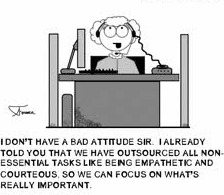In the last few months I’ve started several new relationships. One was with BlueShiled of California — a relationship that was forced on me by the changing health insurance laws. The other came about from trying to find a place to stay in United Kingdom for our family vacation. I didn’t actively want these relationships, but here I am. And I am not very happy.
The basic problem comes from the flow of trust. I’ve never heard of anyone else talk about the directionally of trust, but it is a very important concept to understand for any customer service oriented company. I will illustrate the idea using my new relationships.
BlueShield Customer Service Failure!
Let me start by saying that I wasn’t overly fond of my previous insurance company. In fact, that relationship was very much like this new one with BlueShield — antagonistic. My story begins in October of 2013, when I created a spreadsheet of all my family doctors versus possible new health insurance companies. I wanted to make sure that which ever insurance I picked, my family doctors would take it. I spent the afternoon making phones calls and ended up with BlueShield of California as my top pick. I won’t bore you with my endless travails of trying to sign up for BlueShield, but on January 1st, we were all insured under that company.
We’ve paid a lot of money for family insurance and didn’t really have to use until March. (I’m not complaining about this — this is how insurance works.) In March, we got our first set back. My husband’s doctor wouldn’t take BlueShield! On their reception wall, the doctor’s office even had an enlarged logo of Covered California with big red circle with a strike through it — they don’t take BlueShield if it has that logo on the card. “But we called,” we said, “And you said that you take BlueShield.” But no, we had to pay out of pocket. A nice insurance lady came and explained that our BlueShield was different from the BlueShield they take. The Doctor said that she’ll “never” take BlueShield under California Covered exchange plan!
Okay, that didn’t go well, but perhaps I misunderstood. And if it is only this one doctor, we can manage, we decided.
Next, it was my son’s physical. The staff in the office assured me that they took BlueShield back in October. But when we got to the reception of our pediatrician, the woman said “no.” “Why?” I asked. I explained how I check with them (I have a spreadsheet to prove it). But they were adamant that our card from BlueShield with Covered California logo was defective. We were paying full rate and our doctor visits were NOT being covered!

Okay, I got home and got on the phone with BlueShield — I wanted the card without the stupid logo that made it useless. Over 7 phone calls (with 2 to 4 hour wait on hold and a 30 second music loop) my insurance got canceled — not the outcome I was hoping for. Now my family has no insurance (we are working on a new one)!
The BlueShield representatives gave me wrong information time after time. And finally (after hanging up on me several times), a woman explained that there is NO DIFFERENCE beween BlueShield with Covered California logo and with out. It is just a myth invented by my doctors!
Stop right here and think — who would I trust? The doctors that have been treating me and my family for over 20 years or an insurance rep? My doctor made me better when I was ill, held my hand when my kids were in the hospital, welcomed my sons into the world — in short, I trust my doctors with my life. The BlueShield insurance rep, on the other hand, treated me rather poorly — 15 hours times 30 second loop is 1800 times that I’ve heard the same stupid peace of music fragment over the course of my interaction with BlueShield (this would be classified as torture under the Geneva Convention). Irregardless of how nice the rep is, my stamina was broken. My trust was non-existant. I was not receptive to any apology that they might render.

What I realize is that no health insurance company can ever be the holder of their customers’ trust. Any customer calling the insurance are doing so under duress — they are sick or in pain and their treatment is being denied. This relationship has mountains to overcome to develop even the bare minimum of trust necessary for a successful interaction.

The flow of trust goes from the patient to the doctor: “I trust my doctor to do what’s right for me.” Now this trust can be broken, but most long-term doctor-patient relationships are based on strong feelings of trust.
There is no flow of trust in any direction between the insurance company and their customers (including doctors). The insurance operates based on the assumption that their customers are trying to “cheat” them and get undeserved coverage/money. And customers believe that it is the insurance rep’s job to deny legitimate claims (and they are right).
AirBnB
What about the flow of trust between customers of AirBnB and the people who rent their extra living space for a short term stay? Where is the trust foci here? AirBnB occupies the middle of the transaction, in a similar way that health insurance company is in the middle of the payment and decision process between the patient and a doctor.
In a very real way AirBnB provides insurance to the renter that the person they are renting from isn’t going to take their money and run. And AirBnB provides a bit of assurance for the landlord that the renter interested in their property is a real person. AirBnB holds the money (they insist) and smoothes out this financial transaction.
As a renter who do I trust? The landlord? They try to be very sympathetic — nice images of the property (professionally done photos), well filled out profiles and descriptions (most try to spell well and have detailed information), good portraits (all smiles and children and puppies). And most importantly, each landlord tries to get the best possible reviews — stars as well as stories. I’ve read landlords’ comments on AirBnB that were nasty to people that left bad reviews — I would never rent from those. In fact, these little mini interactions between unsuccessful vacations are the most valuable and revealing about the character of the people who are running their homes as businesses. When everything is fine — great! When things are not working out, then you get a real glimpse into what could happen to you. And it is AirBnB’s job — the reason they are getting their fees — to make bad situations turn out okay.
As a user of AirBnB, I will (might) develop a long term relationship with the company. But I will never have a long term relationship with a landlord, a place where I spend a few night once in a lifetime, no matter how wonderful those nights were. And here’s the problem. Human being are wired to form relationships with other human beings. We are not wired to form relationships with corporate entities. This means that I “want” to form relationship with these landlords on an emotional level, but on a thoughtful level I know these relationships are very superficial and have to be suspicious.
Yesteryears

In the past, insurance people and travel agents were real people with whom we formed long term relationships. We trusted them to make bookings, find good places to stay, and score great deals. A real insurance agent used to be a person who negotiated on your behalf between a doctor and health insurance. But now that we gave the control of these interactions to the end user, flow of trust have changed. We are all expected to be expert at so many things. The doctors want us to make decision on which is the best treatment option. The doctors expect us to fight for our insurance coverage — doctors see themselves as just another set of victims of the health insurance industry. Vacation booking websites place the responsibility on us for checking the veracity of landlords’ claims about their properties. It is our job to find the best airfares and to understand the governmental restrictions. If you screwed up and didn’t read the fin print, it’s your fault. This alter the trust dynamics enormously.

We are handing off the jobs of experts to our social networks. We use halo effect to make judgment — “that landlord has nice hair, so her place must be nice”. It sounds facetious, but that’s how we process information. We make fast judgment calls based on surface features, on easily visible information. And then we spend the rest of the time assuring ourselves that we made the right call.
Product Design
For product designers, the knowledge that people make their decisions based on easily discoverable and understandable information makes us responsible for making the right choices when it comes to displaying user information. We can make some things easy and some things hard. We can make the user see what we want them to see, make them focus on irrelevant information (if we want). We can evoke the wrong mental models, or reinforce mirroring errors. Designers have great power over users’ choices. It would be good if we used that power for good.
